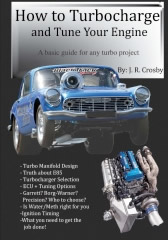| What's Hot! | Products/ Tools | EFI Tuning | Basic Tuning | Advanced Tuning | Chassis Tuning | Advertise with us |
Port and polishing Gasket Matching Basics
Starting with gasket matching
Contributed By: Enginebasics.com
While port and polishing a head or intake manifold might be above most peoples ability or comfort level, something that everyone can do is what is called: Gasket matching. In the machining process of major manufactures there is always tolerances that aren’t perfect. This causes the mating of two of these parts to have slight lips that don’t line up just right. When it comes to airflow we want everything flowing just a smoothly as possible. When you take apart an engine you will notice that most of the gaskets don’t perfectly match the holes they are sealing. This leaves a lip around every flow path that will disrupt and disturb the air flowing through it. With just a little bit of time and some basic grinding tools one can make a motor flow much more efficiently and produce a little more power at the same time.
To show how this is done we are going to use an intake manifold from a Honda J-series V6 motor. First we lay some dye down on the metal to be able to mark the material that needs to be removed. You don’t have to use a dye and could just do it with a sharpie marker, but this is much more convenient.
I picked up mine from amazon here. You will be amazed at how much you will use it to mark other things. It really is great stuff:
Once the material is dyed, we then line the gasket up with all of the mounting holes and mark around each intake port following the gasket around the opening. With the gasket now removed we should have clear marks that we can follow to remove material and match the gasket.
I started with a carbide bur, but I WARN YOU NOW this will eat through metal QUICKLY so I only used it in the parts where there was a decent amount of material to remove. I would not go right to my marked line with this tool, but instead leave a small gap. The burr set I used is below. Click for larger image:
I then pulled out some 150 grit sanding rolls. These are what I would use to actually get close to my mark since they remove material MUCH more slowly. Once I had matched the marked line I then spend time to gradually blend it into the rest of the runner. These I grabed online as well:
Last the gasket is laid back on the intake manifold to make sure everything lined up and looked good. Not hard at all right? Some argue that gains are going to be too small to be felt, while others swear they have picked up a few horsepower by simply gasket matching a motor.
ATTENTION READER:
If you enjoyed the information and article you just read be sure to check out our newly released book with even more exciting photo's and information:How to Turbocharge and Tune your Engine

Want to know more about your particular Make and Model vehicle? All of these vehicles are covered in the tech, maintenance and repair articles found above. Enginebasics is the wiki or wikipedia of car part, repair, how to and tuning information. Let us be the class 101 for your automotive learning.
| Ford | General Motors GM | Pontiac | Jaguar | Land Rover | Nissan |
| Toyota | Honda | Lexus | Acura | Lotus | Scion |
| Infinity | BMW | Mercedes | Mitsubishi | Ferrari | Maserati |
| Lamborghini | Volks Wagen VW | Saab | Audi | Hyundai | Kia |
| Subaru | Mazda | Chevy | Volvo | Caddilac | Dodge |
| Chrylser | Daewoo | Porsche | Mercury | Freightliner | MG |
Individual Models
| Ford Mustang | Mitsubishi Eclipse | Mitsubishi Evo | Subaru WRX / STI | Dodge Viper | Chevrolet Corvette |
| Nissan Skyline | Honda S2000 | Nissan 350z | Toyota Supra | Chevy Camaro | Lotus Elise Exige |
| Honda Civic | VW Golf | Dodge SRT-4 | Eagle Talon | Acura Integra | BMW M3 |
| Nissan 240sx | Porsche 911 | Acura NSX | Honda Accord | Toyota Camry | Toyota MR2 |
| VW R32 | Dodge Truck | Mazda Rx7 | VW Jetta | Sand Buggy | Nissan Sentra |
For the latest Automotive news and stories visit the websites below |
Our feature Build: An AWD V6 Civic





